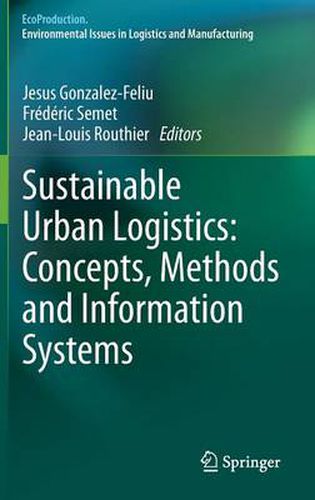Readings Newsletter
Become a Readings Member to make your shopping experience even easier.
Sign in or sign up for free!
You’re not far away from qualifying for FREE standard shipping within Australia
You’ve qualified for FREE standard shipping within Australia
The cart is loading…






This title is printed to order. This book may have been self-published. If so, we cannot guarantee the quality of the content. In the main most books will have gone through the editing process however some may not. We therefore suggest that you be aware of this before ordering this book. If in doubt check either the author or publisher’s details as we are unable to accept any returns unless they are faulty. Please contact us if you have any questions.
Since the 1990’s, researchers, practitioners and public administrations have given more thought to urban logistics. However, their interests and goals are not the same, and several approaches do not produce efficient logistics systems as a result. This book aims to provide both a conceptual framework for urban logistics planning and management and to create a basis for deploying solutions that aim to reduce the main nuisances related to urban goods. The proposed book is divided in two parts. The first proposes a set of methodological chapters, written by key authors, which aim to support decision makers in their current choices related to urban logistics. In addition to public authorities’ aims and goals, the book highlights the importance of private actors, and shows how supply chain management can deal with the problems of the last urban mile and its integration in global logistics chains. The second presents several applied research works that deal with current planning and practice issues in urban logistics, such as the role of city planning, the place of night deliveries in carrier organization, the limits of logistics pooling, and the real estate market, among others.
The book was written by key authors, all having considerable research experience and recognised as experts in their respective fields. Each chapter presents methods and results of research works, written for a broad audience, and more precisely directed to both academics and practitioners.
$9.00 standard shipping within Australia
FREE standard shipping within Australia for orders over $100.00
Express & International shipping calculated at checkout
This title is printed to order. This book may have been self-published. If so, we cannot guarantee the quality of the content. In the main most books will have gone through the editing process however some may not. We therefore suggest that you be aware of this before ordering this book. If in doubt check either the author or publisher’s details as we are unable to accept any returns unless they are faulty. Please contact us if you have any questions.
Since the 1990’s, researchers, practitioners and public administrations have given more thought to urban logistics. However, their interests and goals are not the same, and several approaches do not produce efficient logistics systems as a result. This book aims to provide both a conceptual framework for urban logistics planning and management and to create a basis for deploying solutions that aim to reduce the main nuisances related to urban goods. The proposed book is divided in two parts. The first proposes a set of methodological chapters, written by key authors, which aim to support decision makers in their current choices related to urban logistics. In addition to public authorities’ aims and goals, the book highlights the importance of private actors, and shows how supply chain management can deal with the problems of the last urban mile and its integration in global logistics chains. The second presents several applied research works that deal with current planning and practice issues in urban logistics, such as the role of city planning, the place of night deliveries in carrier organization, the limits of logistics pooling, and the real estate market, among others.
The book was written by key authors, all having considerable research experience and recognised as experts in their respective fields. Each chapter presents methods and results of research works, written for a broad audience, and more precisely directed to both academics and practitioners.